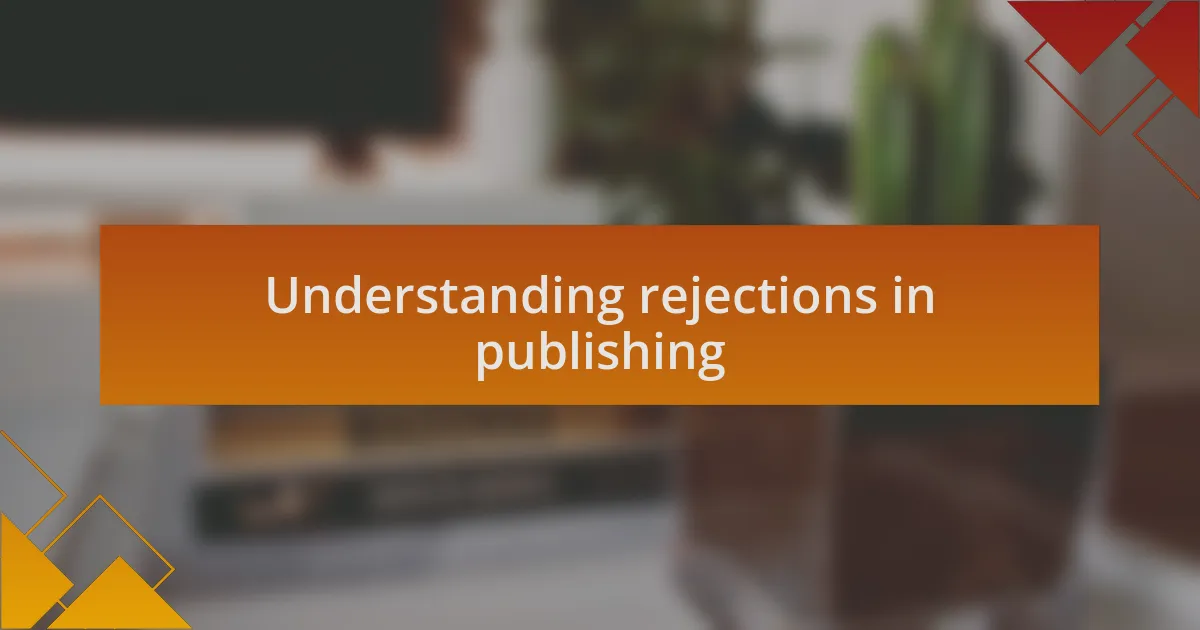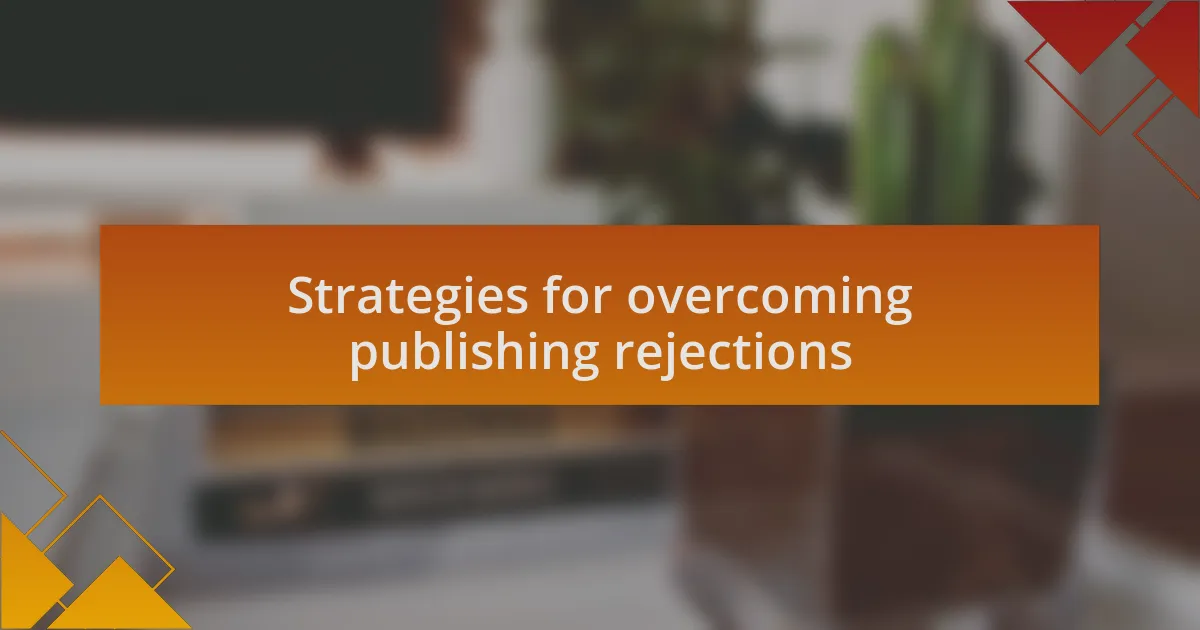Key takeaways:
- Rejections should be viewed as feedback and learning opportunities, rather than personal failures.
- Understanding common reasons for rejection, such as market fit and editor preferences, can help improve submissions.
- Constructive criticism from rejections can prompt significant improvements in writing quality and style.
- Cultivating resilience and a supportive network can transform the rejection experience into motivation for growth.

Understanding rejections in publishing
Rejections in publishing can sting more than we often expect. I remember receiving my first rejection letter; it felt like a gut punch. But reflecting on that experience, I found it was less a reflection of my worth and more about the fit between my work and the publisher’s current needs. Have you ever felt that initial wave of despair only to realize later it was a stepping stone to something greater?
Understanding rejections requires a shift in perspective. Instead of viewing them as failures, I started seeing each one as feedback. Often, the reasons for rejection are not personal; they can be rooted in market trends, or even the editor’s personal preferences. Does a rejection mean there’s something wrong with your writing or your story? I’ve learned that rejection can often be an invitation to revise and improve.
At times, I felt overwhelmed by the sheer number of rejections I faced before finding success. Yet, each “no” brought me closer to the right “yes.” This journey taught me resilience. Each rejection has its lesson; we just need to be open to learning from them. What’s the most important lesson you think you could extract from a rejection?

Identifying common reasons for rejection
Identifying common reasons for rejection often starts with understanding the specifics of your submission. I recall one instance where my manuscript was turned down because it simply didn’t align with the publisher’s current catalog. It made me realize that sometimes, even the best work can be rejected if it’s not a strategic fit. Have you ever submitted a piece and wondered why it didn’t resonate with the intended audience?
Another frequent reason for rejection is a lack of marketability, which can feel frustrating when you believe in your story. I remember submitting a piece that I thought was unique, only to receive feedback that it was similar to several books already on the shelves. This taught me the importance of market research; knowing what’s out there can help you identify gaps where your work might shine. How often do you evaluate the market before putting your work out there?
Connection also plays a critical role in the acceptance of a manuscript. An editor’s personal taste can significantly influence their decision. In one case, I received a rejection citing that the theme was too niche for their audience. This experience highlighted for me how subjective publishing can be. Have you considered that your work might be perfect for another editor who shares your vision?

Learning from feedback on rejections
Feedback on rejections can be a powerful tool for growth. I recall a time when I received a rejection accompanied by detailed comments from an editor about my character development. Initially, I felt disheartened, but those insights led me to completely reshape my protagonist, ultimately making the story much stronger. Have you ever received feedback that, though hard to hear, spurred you on to improve your work?
It’s important to approach feedback with an open mind. I remember a particularly stinging rejection where the editor suggested my pacing was inconsistent. At first, I wanted to dismiss their opinion, feeling protective of my writing. But after some reflection, I realized that understanding pacing could enhance the reader’s experience. How often do you take a step back and reassess your work based on others’ perspectives?
Sometimes, the feedback reveals deeper truths about our writing style. An editor once pointed out that my dialogue felt unnatural in a certain piece. This was a wake-up call, prompting me to pay closer attention to how I craft conversations in my stories. It’s incredible how external perspectives can challenge us to refine our craft. Have you experienced a moment where constructive criticism reshaped your writing?

Personal reflections on my rejections
Reflecting on my rejections, I often find that they teach me more than any acceptance ever could. I remember receiving a rejection due to the “lack of clarity” in my narrative. At first, I felt a wave of frustration, but it pushed me to dig deeper into my writing process. Have you ever felt that shift from disappointment to motivation after receiving critical feedback?
There was a time when I submitted a piece only to be met with a blanket rejection. The editor didn’t provide any explanation, which left me feeling lost and questioning my abilities. However, that experience became a catalyst for self-reflection. It reminded me of the importance of resilience; sometimes, it’s not the rejection itself that matters, but how we respond to it. How have you used moments of ambiguity in your writing journey?
I encountered a rejection that was truly heartbreaking. An editor praised my premise but ultimately decided it wasn’t a fit for their publication. I felt deflated but also recognized it as an opportunity to refine my pitch. This experience taught me that not every “no” is a reflection of my talent—it can simply mean that my work wasn’t right for that moment. Have you ever turned a painful rejection into a stepping stone toward your goals?

Turning rejections into motivation
There was a time when I faced a series of rejections all at once. I remember sitting at my desk, feeling completely overwhelmed. But then I asked myself, “What if each of these rejections is nudging me toward something better?” That shift in perspective fueled my determination to work harder and improve my craft.
I once received a rejection with a few thoughtful comments attached. While I initially felt deflated, those little insights sparked a fire in me. It was as if the editor handed me a map, guiding me toward the areas I could develop further. Have you ever considered that someone else’s insight could be the cornerstone of your next breakthrough?
Reflecting on my writing journey, I’ve learned to view rejection as a stepping stone rather than a stumbling block. Each “no” pushed me to tap into my creativity in new ways. I often remind myself, “Every rejection is an invitation to grow.” What if, rather than letting rejections bring us down, we harness their energy to fuel our passion for storytelling?

Strategies for overcoming publishing rejections
When it comes to overcoming rejections in publishing, revising your work can be incredibly beneficial. I recall a specific moment when I took a rejection that felt personal and dissected it. I spent a weekend fine-tuning the manuscript, diving deep into character development and plot structure. The result? My story transformed into something I was genuinely proud of, and eventually found a publisher. Have you ever thought about how much a fresh perspective can breathe new life into your writing?
Networking with fellow writers can also serve as a powerful strategy. During a particularly tough spell of rejections, I attended a local writer’s group meeting and shared my experiences. The support and camaraderie I found there were incredible. We exchanged stories and strategies, reminding me that I’m not alone in this journey. Isn’t it comforting to know that others share similar struggles, and together, we can find greater strength?
Lastly, cultivating a resilience mindset is essential. Each rejection is often just one person’s opinion at one moment in time. I learned to remind myself that the literary world is subjective; every “no” just brings me closer to the right match. When I shifted my mindset to view rejections as opportunities to explore new directions, it felt liberating. How can you redefine rejection in your journey to make it a stepping stone rather than a barrier?